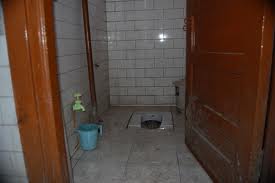
Lucknow, April 26: This one really stinks. UP, home to scams of all kinds, ranging from NRHM to land, now has a filthy new entrant: the Toilet Scam.
The state was to build toilets in rural households under the Centre-sponsored Total Sanitation Campaign. The state panchayati raj department told the ministry of rural development that it got 1.71 crore toilets constructed under the scheme in the past one decade. But the household census data says that only 55 lakh rural households have toilets. Which means, 1.16 crore toilets in rural UP are "missing".
The Total Sanitation Campaign was launched in 1999 to end open defecation in India by 2017. The scheme got functional in UP in 2002. Under the programme, various sections of the society were given a subsidy to get permanent toilets built in their houses. In 2002, the amount was about Rs 600; now, this has gone up to around Rs 4,500. Assuming the average expenditure on construction of new toilets was Rs 2,500, the Toilet Scam would work out to Rs 2,900 crore.
The extent of over-reporting has been close to three times , say experts. According to TSC reports, there are only 17.50% households without toilets in rural UP. whereas the census reports that more than 78% of the households do not have latrines within their premises. According to TSC online data, there are two districts in UP, Lakhimpur Kheri and Farrukhabad, where 100% households have toilets whereas census 2011 reports show 81.7% and 76.10% households are without toilets in the respective districts.
The extent of over-reporting has been extremely high in Lucknow as well. The official data for households without toilets says that one in 10 (10.16%) houses don't have toilets. In other words government data says that 89.84% of the households in Lucknow have a toilet. But the census figures say that only 65.6% households have toilets on their premises.
Because of this scam, the very aim of TSC stands defeated in the state with actually now more people defecating in the open. During the decade 2001-2011, of all the people defecating in open in the country, UP alone accounts for 39.05%. In absolute terms, 35.31 lakh households are defecating in the open in the state. And 93% of them are in rural areas. Sources claimed that lack of a monitoring mechanism led to the problem. The union government is now mulling over whether to get the flagship programme examined by CAG auditors.
"A peep into the house of a villager in UP shows how women live without toilets. They go in groups to fields every morning. Some women feel that loose motions are a curse as they have to run to the fields during the day," said Madhu Garg, secretary, All India Democratic Women's Association. She added that the problem for women in urban slums was worse. "In pakka talaab area of Chinhat for instance, women are exposed to eve-teasing when they go out for nature's call," she said.





Comments
Add new comment